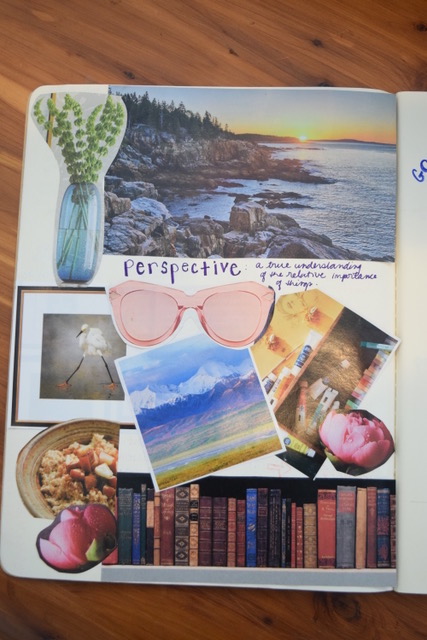
The beginning of a new year is a great time to consider where we are in life, what matters to us, and where we want to go. But setting typical resolutions (Exercise more! Travel! Eat less sugar! Read!) doesn’t work for everyone, or even for most people: Approximately 80 percent of individuals (including me!) who make New Year’s resolutions have abandoned them by the middle of February.
Still, just because resolutions typically fizzle out within weeks of being made doesn’t mean that the practice of reflection and commitment in the early days of January should be abandoned. Perhaps New Year’s goal-setting just needs a little makeover.
In recent years, after being inspired by my go-to self-improvement podcast, I’ve made a practice of choosing a word, a quote, and a quest to guide my calendar year. These items aren’t goals to be accomplished but a framework to direct my mindset, free time, and priorities. I typically spend the week between Christmas and New Year’s journaling about my past year and considering my intentions for the year ahead, and from this reflection, I enter January 1 with direction and enthusiasm.
A Word to guide my year

A word for the year is like a hyper-focused mantra that plays on repeat in your mental soundtrack for twelve months. To choose my word, I make a list of all of my current hopes and dreams, and then underline themes and circle key words. From there, I brainstorm a list of words related to my annotations (consulting a list of potential words for the year can be helpful). I spend a few days mentally percolating my list, and usually, one of the words will rise to the top.
Some of my past words have been “levity,” “perspective,” and “reach.” Once I’ve selected my word, I’ll create some sort of visual (one year, I made a collage with magazine clippings, and another year, I made a Pinterest board) and I’ll write a list of actionable items related to the word. For example, the year I chose “reach,” my list included pitching articles to three new publications, training for a half-marathon, and going deeper in conversations with colleagues. I was craving challenge and expansion that year, and this word set me on the path for both.
A quote to inspire my year
I choose a quote for the year after selecting my word by Google-searching “quotes about levity/perspective/reach/etc” and perusing the running document of favorite poems and passages that I keep on my computer. If a quote resonates with me in a special way, I pick it. Once chosen, I write the quote(s) on index cards and strategically scatter them throughout my life: on the fridge, taped to the bathroom mirror, as a bookmark in my daily devotional, and in the pocket of my planner. I also use a free graphic design website to create a computer desktop image and phone wallpaper with my quote at the center.
Though my quote (or quotes! Sometimes I choose several) often relates to my word for the year, sometimes it doesn’t. For example, the year of “reach,” I chose to focus on Flannery O’Connor’s words: “Accepting oneself does not preclude an attempt to become better” and Aristotle’s: “We are what we repeatedly do.” I like choosing quotes for the year because well-written passages make values come alive and stick in my memory in a way that a single word does not.
A quest to energize my year
While quest is defined as a “long or arduous search for something,” I will admit that my yearly quests lean more heavily into the “long” component than the “arduous” one. I choose a long-term goal for the year because it motivates me to dive deeper into a topic that interests or delights me, but wouldn’t naturally garner my time and attention. Life is busy, and I know that unless I intentionally choose to devote my energy to pursuing a passion project, it won’t happen. Naming a quest is a way of committing to the pursuit of learning and joy.
My past quests have included everything from “Become a Carl Jung expert” (using the term expert very loosely!) to “Make use of my cookbook shelf.” For the former, I committed to reading at least five books by or about Carl Jung (for years I had been interested in learning more about Jung’s concept of individuation, which has to do with reaching inner integration and wholeness) and for the latter, I determined that I would try at least one new recipe from each of my cookbooks. Unlike my word and quote for the year, I don’t put a lot of thoughtful consideration into choosing my quest. I just wait for a thought like “I’d like to learn more about/try/spend time on such-and-such topic” to cross my mind. And then, voila! I have a mission.
New Year’s resolution-making isn’t a practice for everyone, but all of us can use the start of the year (or any chosen day of our lives, for that matter!) as a catalyst for reflection. Choosing a word, quote and quest for the year is a way to let our New Year’s hopes and dreams touch our lives in concrete ways, transforming that reflection into action.
Originally published on January 1, 2020.